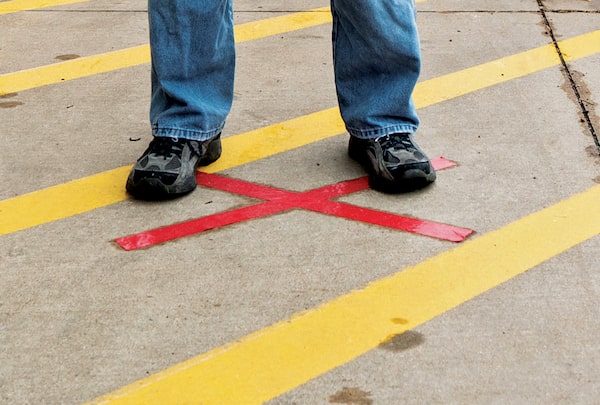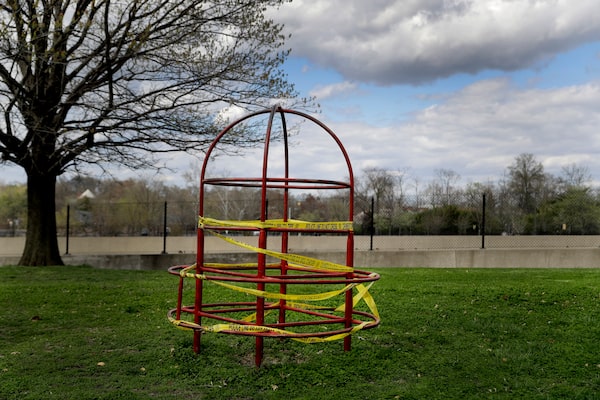
A shopper lines up to enter a Home Depot store while practicing physical distancing to help slow the spread of the coronavirus, in north St. Louis, Missouri, on April 4, 2020.LAWRENCE BRYANT/Reuters
Sarah Kendzior is the co-host of the podcast Gaslit Nation and author of the newly released book Hiding in Plain Sight.
“What’s the last ‘normal’ thing you did,” a friend asked, “before coronavirus changed our lives?”
“I voted,” I replied. “It felt like the last time.”
On March 10, 2020, I cast a vote in the Democratic primary in Missouri, the Midwestern state where I live. This was during the week when everyone knew COVID-19 had come, but U.S. officials were too terrified to admit its severity – a state of mind that encapsulates not only this dark era but the decades that preceded it. Fear of seeming alarmist overpowered the need to sound the alarm. Refusal to admit that the worst was possible all but ensured that it came to pass. There are professionals who spend their lives refusing to look the other way: epidemiologists, climate change experts, scholars of fascism. But there is no comfort, these days, in being right.
The building where I voted closed down the following week. It used to be our community centre, but today community – the strongest defence against encroaching authoritarianism – breeds contamination. Our community in St. Louis was always fragile. Our region never recovered from the 2008 global economic crash and it’s clear, now, that we never will. We’re a mostly black region in a mostly white state, a mostly liberal community in a mostly conservative state. We are the outlier, always struggling, now decimated anew.
When a person votes, it’s with an eye to the future: to freedom and accountability, to a better way. When you enter a voting area, you are at one with your community in a way you rarely are otherwise, united in a hard-fought ritual. Most people who voted alongside me didn’t have the right to vote a century ago owing to race or gender, or both. Under the Trump administration, and under the Republican government that took power in Missouri in 2016, our rights became ever more tenuous.
St. Louis is not a place where people take things for granted. It was always obvious how easily things could collapse. We see vestiges of prior collapse in our endless empty spaces, the storefronts and homes that required no quarantine because their inhabitants had long ago fled. We know what it’s like to feel abandoned and maligned at the same time. Over the 21st century, many Americans came to know that feeling, as they struggled with the consolidation of wealth and the demonization of vulnerable citizens. As austerity and authoritarianism grew in tandem worldwide, other countries came to feel that loss, too – a grief not for the past, but for the future. Yet we still could not fathom how much we had left to lose.

A person walks past the words 'Rent Strike' written in large letters on the side of the Compton Hill Reservoir wall on April 2, 2020, in St. Louis.Jeff Roberson/The Associated Press
It didn’t have to be this way. The Trump administration was warned by U.S. intelligence in January that coronavirus was a major threat. By early February, the outbreak in Wuhan had made the front pages of U.S. newspapers. Viral videos from Chinese, Iranian and Italian doctors emerged on social media, begging the world not to repeat their mistakes.
But U.S. President Donald Trump and his team lied about the virus and let it spread across the country while refusing to order much-needed medical supplies. Some Republicans, such as Senator Richard Burr, used classified intelligence on the pandemic to allegedly carry out insider trading, making a killing on the stock market off the killing of Americans. Other officials remained merely inadequate, clinging to popular myths – that COVID-19 isn’t as bad as the flu or young people aren’t affected by it – to justify their desperate commitment to maintaining the façade of normal life.
The problem is that most of us have never experienced normal life in the first place. Normal life is a rumour I was told about as a child. Normal life happened to other people. Normal life is not a condition but a fantasy, the comfort we craved over the past five years of record-breaking fires and floods, of unprecedented venality and boundless theft, of the flagrant shattering of norms and laws by a corrupt elite.
The desire to go back to normal is the yearning for the weight of corruption to not only be lifted, but to be acknowledged as existing at all. How many of us, over the past few years, as we debunked lie after lie and absorbed scandal after scandal, felt like we were doing the job of Congress, of law enforcement, of anyone officially tasked with keeping these crises in check?
How many of us would like to shed that burden of hyper-vigilance, which far exceeds the standard of civic participation, but know we cannot, because if we aren’t warning others, who will? A warning is, in the end, a confession – a declaration of what you value and who you will fight to protect. COVID-19 may be novel, but the mentality needed to battle it – constant attention to crisis, refusal to abandon those you love – is old news.
The coronavirus pandemic is not only a public-health crisis, but a political one. Its origin might be natural, but its spread and exploitation are not. The virus emerged in a world of rapidly consolidating autocracies: the United States, Britain, Russia, Israel, Hungary, Brazil – and that is not a comprehensive list. The leaders of these countries seem apathetic as to whether their citizens die. In Russia, oligarchs are hoarding ventilators. In Israel and Hungary, corrupt leaders use the virus as an opportunity to consolidate power. In Brazil, the President proclaimed, “We’ll all die one day,” and let the virus spread. In Britain, the Prime Minister encouraged “herd immunity” – and then found himself in the ICU with coronavirus. Now, the country is shut down.
Has there ever been a time in world history where so many people are this vulnerable and are ruled by so many sadistic elites? Perhaps, but the toll of their malice was never so well-documented. Separated by social distancing, our sense of community comes through our cellphones – the deep grief of a mounting death toll, livestreamed minute by minute. It’s hard to look at, but it’s harder to look away.
In this era where few officials express the most basic empathy, you feel a desire to bear witness: to acknowledge every life, every loss, as profound. You do not want anyone to feel abandoned, because abandonment is how we got here. Those in charge abandoned accountability and then they abandoned the truth.

Playground equipment is wrapped in crime scene tape to prevent its use as part of the effort to slow the spread of the coronavirus, on March 31, 2020, in St. Louis.Jeff Roberson/The Associated Press
The truth is the virus of autocrats and criminal elites. They cannot stomp it out, and they scramble to keep themselves from being exposed. They do this by commanding the mechanisms of power and, once in office, rewriting the laws so they’re no longer breaking them.
In the United States, they were able to do this because officials refused to enforce accountability for the crimes of the wealthy and well connected. That’s why you see the same names – Donald Trump, Paul Manafort, Roger Stone, Bill Barr, Jeffrey Epstein, Rupert Murdoch, John Bolton – repeating throughout decades of horrific American scandals. Watergate, Iran-Contra, the war in Iraq, the 2008 financial collapse, and the illicit foreign interference in the election of Mr. Trump share many of the the same participants.
But it’s not solely the GOP that’s to blame – it’s everyone who looked the other way, everyone who waited for someone else to sort it out, everyone who settled for false stability over real justice.
Avoidance is a dangerous strategy. It doesn’t actually keep the peace; it turns elite criminal impunity into elite criminal immunity, as the corrupt pack the courts and order their own exoneration. These tactics have been most blatant during Mr. Trump’s rule, as he dispensed with even the pretense of serving the public good. But it was true of every administration of my lifetime, dating back to the Reagan era. The 2020 election offered a fleeting chance to tackle institutional corruption. But it’s uncertain now whether that election will even be held. As election integrity experts push for voting by mail as the safest method to employ during the pandemic, the Trump administration is trying to shut down the post office.
The other day, I looked across the street at the community centre where I cast what may have been my last vote. My neighbourhood was silent. Missouri spring in all its beauty – the blooming dogwood trees and wildflowers make my downtrodden region a hidden treasure. You’d never know death was in the air.
Corruption is like that, too – invisible until it shatters your life. My comfort in this time is that the same can be said of truth. Truth is still out there, hiding in plain sight, and its revelations can rearrange the world.
There are people to blame for these crises of corruption, but there’s a difference between vengeance and justice. To tell the truth is to try to bring justice to the vulnerable, to protect people from further harm. These days, the vulnerable is all of us. No one is immune – not from the crisis of public health and not from our political crisis, because they are one and the same. What was predictable was preventable, and no one deserved this fate.
Keep your Opinions sharp and informed. Get the Opinion newsletter. Sign up today.